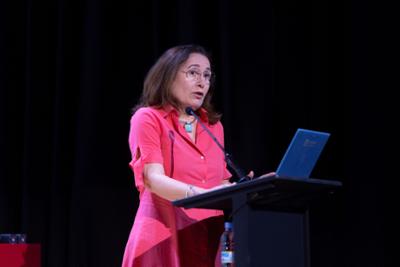

RITE will increase environmental quality and renewable energy requirements
The Regulation of Thermal Installations in Buildings (RITE) will increase the requirements for environmental quality and renewable energy, explains Mar Blázquez, deputy assistant director for Energy Efficiency and Access at the Ministry for Ecological Transition and the Demographic Challenge, at the 20th Annual Meeting of Atecyr.
Mar Blázquez explained the characteristics of the new European Energy Performance of Buildings Directive (EPBD) and the regulatory and structural challenge it poses for Spain; and gave a detailed overview of the process of transposition into Spanish law, in the context of the common goal of achieving an emission-free building stock by 2050.
The Deputy Assistant Director for Energy Efficiency and Access to Energy began by pointing out the central role to be played by both the Ministry for Ecological Transition and the Demographic Challenge (MITECO) and the Ministry of Housing and Urban Agenda (MIVAU) in this process. "While MITECO will lead the technical and energy aspects, MIVAU will assume regulatory coordination related to the Technical Building Code and the national rehabilitation plans". "This inter-ministerial cooperation will be key to ensuring coherent, realistic and effective implementation," he said.
Regulatory changes
Blázquez reviewed the main areas where regulatory changes are foreseen. Among them, he referred to the update of the Regulation of Thermal Installations in Buildings (RITE), which will incorporate new requirements related to automation, control, indoor environmental quality, renewable energy storage and technical inspections. On the other hand, he pointed to the development of a new system of minimum energy performance standards (MEPS) for existing non-residential buildings, which will establish maximum energy consumption thresholds and force the progressive renovation of less efficient buildings in the coming years, especially from 2030 onwards. It is expected to be developed in an exclusive royal decree.
Thirdly, he recalled the revision of the basic energy certification procedure, which now has a new scale based on the zero emission building (ZEB) concept, the redesign of the indicators and the incorporation of the renovation passport as a strategic document for planning successive interventions in buildings.
Support instruments
With regard to support instruments, he stressed the importance of strengthening funding mechanisms and simplifying administrative procedures, and emphasised the need to support municipalities and small local authorities, which have fewer technical means to meet regulatory requirements. He also alluded to the social implications of the directive, stressing that the energy transition must go hand in hand with public policies of inclusion and equity to prevent the new energy efficiency obligations from accentuating situations of vulnerability or exclusion.
Finally, he recalled that public buildings should lead this transformation, with greater demands for compliance in terms of deadlines and standards, and with an exemplary role that promotes confidence in regulations and aid instruments.





